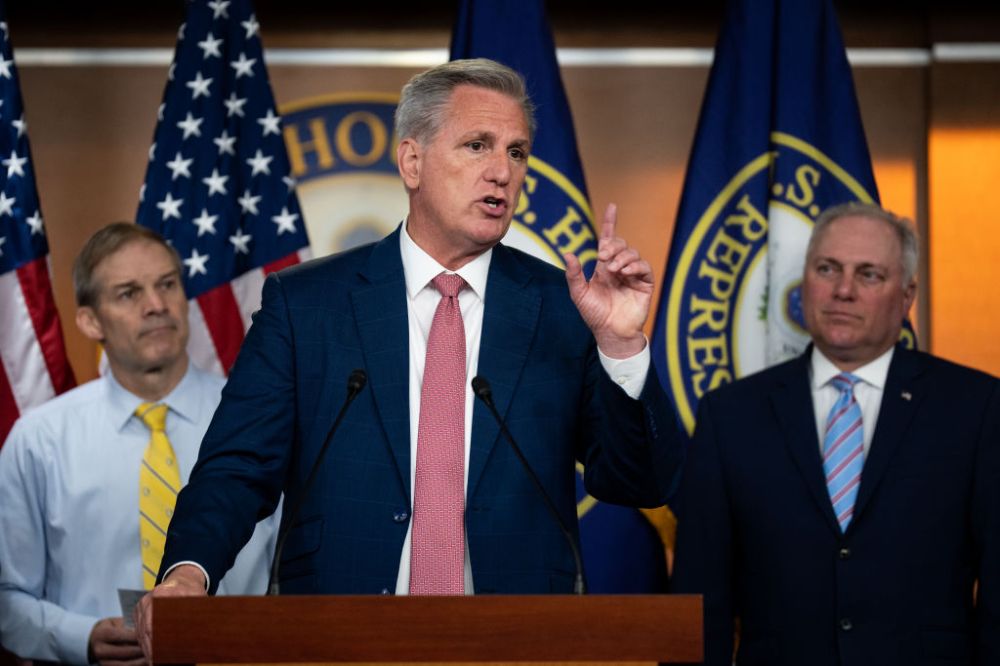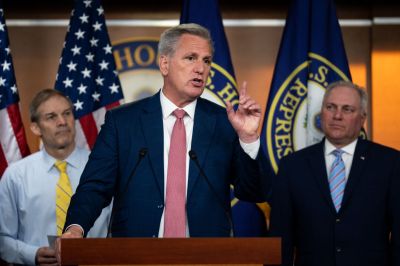Former President Donald Trump may be arrested soon. The fact that an arrest hasn’t happened yet—and that other details remain unclear—isn’t stopping House Republicans from demanding answers from New York prosecutors.
Three House GOP committee chairmen sent a letter to Manhattan District Attorney Alvin Bragg on Monday asking for documents related to the legal probe. They also hinted that Congress could take action, such as withholding public safety funds from local law enforcement agencies. The lawmakers set a Thursday deadline for Bragg to schedule a transcribed interview with congressional staff about the case, which Republicans argue is political.
“You are reportedly about to engage in an unprecedented abuse of prosecutorial authority: the indictment of a former President of the United States and current declared candidate for that office,” the Republican lawmakers—Judiciary Committee Chairman Jim Jordan, House Administration Committee Chairman Bryan Steil, and House Oversight Committee Chairman James Comer—wrote.
They added that Bragg’s actions “will erode confidence in the evenhanded application of justice and unalterably interfere in the course of the 2024 presidential election.”
As my colleagues wrote in today’s Morning Dispatch, the case hinges on a $130,000 hush money payment by then-Trump attorney Michael Cohen to porn actress Stormy Daniels before the 2016 election, intended to keep her quiet about an alleged affair with Trump in 2006. More from today’s edition:
Cohen alleges the Trump Organization reimbursed him and made accompanying payments to the ultimate tune of $420,000, and he pled guilty in 2018 to federal charges that the payment—along with a similar one to model Karen McDougal—amounted to illegal campaign contributions. The sentencing memorandum in Cohen’s case says Trump’s company falsely accounted for those payments by portraying them as legal retainer fees to Cohen.
Trump has predicted he will be indicted as soon as today and called for Americans to “PROTEST, TAKE OUR NATION BACK!” when it does happen.
Leading House Republicans are splitting with the former president on that point: House Speaker Kevin McCarthy told reporters he doesn’t think Trump supporters should protest the indictment. Even staunch Trump ally Rep. Marjorie Taylor Greene has said protests aren’t necessary.
Capitol Police are still monitoring online chatter about the case and have set up an elevated security posture around the complex today, as have New York City authorities at a courthouse in lower Manhattan.
Senate Debates 2002 AUMF Repeal
How long does it take Congress to end an authorization for a war once it ends? Somewhere between one and three decades.
Senators will vote this week on legislation ending the 2002 authorization for the use of military force (AUMF) against Iraq and the authorization for the 1991 Gulf War. Lawmakers have long targeted the 2002 authorization for repeal, fearing it could be abused by presidents to justify military actions members of Congress never intended and that are hardly related to the original authorization.
Former President Donald Trump’s 2020 strike that killed Iranian Quds Force leader Qassem Soleimani as he was traveling in Iraq partly rested on the 2002 authorization. That added to lawmakers’ sense of urgency to repeal it, but it also made the matter more politically fraught. Only 11 House Republicans joined most Democrats in voting to repeal the authorization in January 2020, shortly after the strike. The next year—with a Democrat in the White House—GOP support grew: 49 House Republicans backed a repeal. But getting both chambers on the same page has been difficult: The last attempt didn’t receive a Senate vote.
This year may finally see the 2002 AUMF repeal effort’s success. It has bipartisan support and seems ready to clear the Senate’s 60-vote threshold for passage. A procedural vote to consider the legislation last week passed 68-27, and President Joe Biden has said he supports it. In the House, the legislation has support from conservative Rep. Chip Roy and a powerful Republican leadership ally, Rules Committee Chairman Tom Cole.
Speaker Kevin McCarthy said over the weekend that the measure would have to go through the House Foreign Affairs Committee before the full House considers it, but “it has a clear opportunity to come to the floor.”
The Senate vote this week coincides with the two-decade anniversary of the start of the Iraq war.
“Congress is responsible for both declaring wars and ending them because decisions as important as whether or not to send our troops into harm’s way warrant careful deliberation and consensus,” Virginia Democratic Sen. Tim Kaine, a leading sponsor of the measure, said when he reintroduced it earlier this year. “The 1991 and 2002 AUMFs are no longer necessary, serve no operational purpose, and run the risk of potential misuse.”
Opponents of repealing the authorization, such as Senate Minority Leader Mitch McConnell and Sen. John Cornyn, argue it could send the wrong message to America’s adversaries.
Some supporters lament that it doesn’t go far enough: Kentucky Sen. Rand Paul may attempt to secure a vote on ending the 2001 authorization for the use of military force, which Congress passed in the aftermath of the terrorist attacks of September 11. That authorization was used throughout America’s 20-year war in Afghanistan and still underpins much of the American global war on terror today.
“They all say, ‘Not the time or place,’” Paul said last week of the lawmakers who support keeping the 2001 authorization intact. “It’s like, when the hell is the time and place to end a war that’s now over?”
China Select Committee to Highlight Xinjiang Genocide
Two witnesses of the Chinese government’s mass detention camps in Xinjiang will tell their stories before the new House select committee on competition with the Chinese Communist Party this week. The committee’s second public hearing is meant to shed light on the Chinese government’s genocide of Muslim ethnic groups in the region.
Qelbinur Sidik and Gulbahar Haitiwaji are expected to appear before the panel Thursday night, according to a source familiar with the witness list, the details of which a spokesperson for the panel confirmed to The Dispatch.
Sidik worked as a Chinese-language teacher in detention camps in Xinjiang in 2017, where she observed human rights abuses and harsh treatment of prisoners. Haitiwaji is an ethnic Uyghur camp survivor who has described horrific conditions, including being shackled to a bed for 20 days.
Nury Turkel, chairman of the U.S. Commission on International Religious Freedom, is also slated to testify about the genocide. He may also highlight the long oppression Uyghurs and other ethnic minorities have faced in Xinjiang. He was literally born in a Chinese prison center and co-founded the Uyghur Human Rights Project advocacy organization in 2003. His human rights work has kept him from being able to safely visit family members in Xinjiang.
Turkel has pressed for a stronger American response to the genocide, a message he may emphasize Thursday.
Lawmakers will also hear from Adrian Zenz, the German researcher whose work was essential in unveiling the scale of the camps and contributed to the American government’s designation of the abuses as genocide. Naomi Kikoler, director of the Simon-Skjodt Center for the Prevention of Genocide, is expected to appear before the panel as well.
On the Floor
House Republicans may bring forward the Parents Bill of Rights Act this week. The legislation would require elementary and secondary schools to disclose reading materials in school libraries, course curriculum information, and parents’ rights related to their childrens’ education.
A full list of other bills the House may consider this week is available here.
The Senate will continue to debate the 2002 AUMF repeal this week.
Key Hearings
- Moderna CEO Stéphane Bancel is slated to appear before the Senate committee that deals with health policy on Wednesday morning for a hearing about the company’s proposed hike in COVID-19 vaccine prices. Information and livestream here.
- Secretary of State Antony Blinken will testify before the Senate Foreign Relations Committee Wednesday afternoon during a hearing about the Biden administration’s fiscal year 2024 budget request for the department. Information and livestream here.
- Senators on the Judiciary Committee will meet Wednesday afternoon to examine the beleaguered U.S. refugee admissions program. Information and livestream here.
- TikTok’s CEO is expected to face questions from lawmakers on the House Energy and Commerce Committee during a hearing Thursday morning focusing on privacy. Information and livestream here.
- The House Appropriations subcommittee on defense will hear from Defense Secretary Lloyd Austin and Joint Chiefs of Staff Chairman Mark Milley Thursday morning about the military’s budget request for the upcoming fiscal year. Information and livestream here.
- The Senate Homeland Security and Governmental Affairs Committee will debate modernization of the government’s classification system during a hearing Thursday morning. Information and livestream here.
- The House select committee on competition with the Chinese Communist Party will hold a hearing Thursday night on the genocide in Xinjiang. Information and livestream here.






Please note that we at The Dispatch hold ourselves, our work, and our commenters to a higher standard than other places on the internet. We welcome comments that foster genuine debate or discussion—including comments critical of us or our work—but responses that include ad hominem attacks on fellow Dispatch members or are intended to stoke fear and anger may be moderated.
With your membership, you only have the ability to comment on The Morning Dispatch articles. Consider upgrading to join the conversation everywhere.